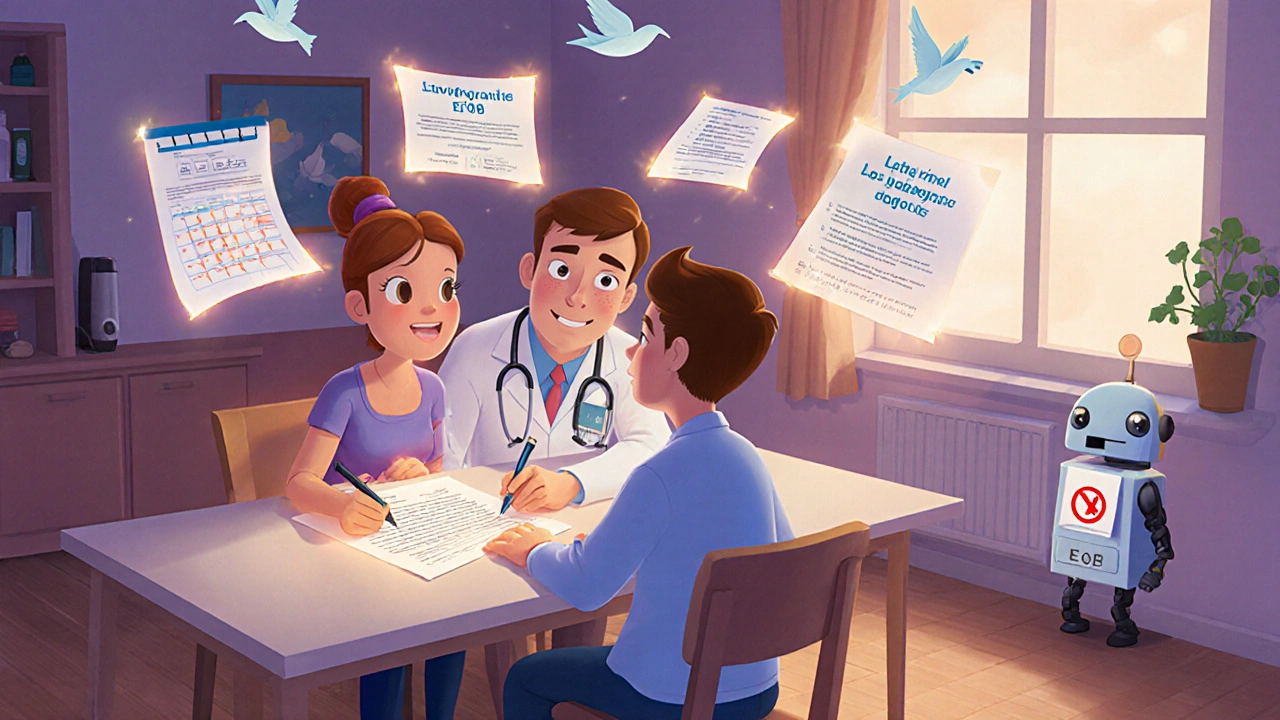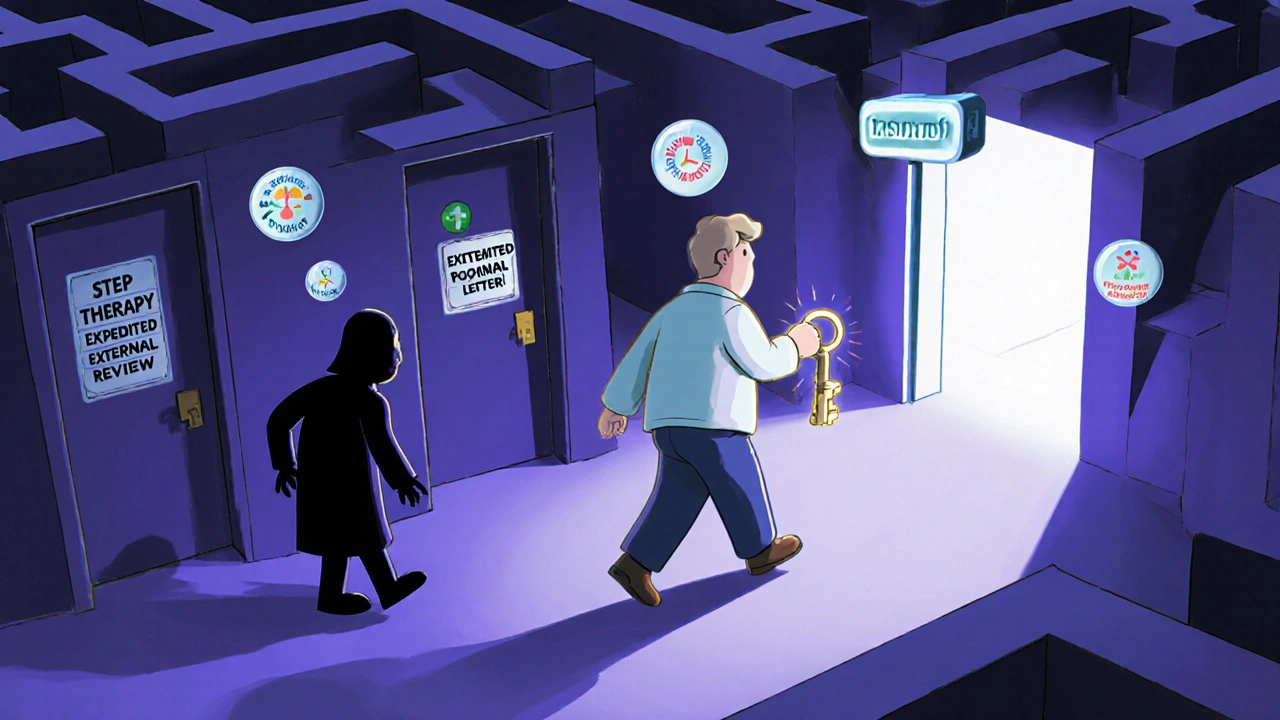How to Appeal Insurance Denials for Generic Medications: A Step-by-Step Guide
 Nov, 19 2025
Nov, 19 2025
When your doctor prescribes a brand-name medication, but your insurance forces you to switch to a cheaper generic version - and you know it won’t work for you - you’re not alone. Thousands of people face this every year. The good news? You can fight back. Insurance companies don’t always get it right, and there’s a clear, legal process to appeal their decision. This isn’t about arguing over price. It’s about getting the right medicine for your body.
Why Your Insurance Might Deny Your Medication
Most health plans use something called a formulary - a list of approved drugs they’ll pay for. Generic versions are often listed first because they cost less. But not all generics are the same for everyone. If you’ve tried a generic before and had bad side effects, or if your condition requires a specific brand for stability, your doctor should be able to explain why the alternative won’t work. Insurers also use step therapy, meaning they make you try cheaper drugs first before approving the one your doctor picked. Sometimes, that’s fine. Other times, it delays care or makes symptoms worse. That’s where the appeal comes in.Step 1: Get Your Explanation of Benefits (EOB)
The first thing you need is your EOB - not the bill, but the detailed letter from your insurer explaining why they denied coverage. This document must include:- The exact name of the medication denied
- The reason for denial (e.g., “step therapy not completed,” “generic preferred”)
- Instructions on how to appeal
- The deadline to file
Step 2: Talk to Your Doctor - Immediately
Your doctor is your most powerful tool. They need to write a letter of medical necessity. This isn’t a quick note. It needs to include:- Why the generic version won’t work for you - list specific side effects, past failures, or lab results
- Proof you’ve tried other alternatives (if step therapy applies)
- References to clinical guidelines - like those from the American College of Physicians or the American Diabetes Association
- A clear statement: “This medication is medically necessary for this patient.”
Step 3: Fill Out the Official Appeal Form
Your insurer will have a form - sometimes online, sometimes paper. Look for titles like “Prescription Drug Prior Authorization or Step Therapy Exception Request.” Don’t skip this. Even if you’ve sent a letter, the form is required. Make sure you include:- Your full name, date of birth, insurance ID
- Drug name, dosage, and quantity requested
- Prescribing doctor’s name and contact info
- Attachment of the doctor’s letter
- Any lab reports or previous treatment records
Step 4: Submit and Track Your Appeal
Send your appeal via certified mail or online portal - keep a copy. Most insurers must respond within 30 days for non-urgent cases. If you’re already taking the drug and stopping it would harm you, request an expedited review. That cuts the timeline to 4 business days. Call your insurer weekly to check status. Many people report getting conflicting answers - “It’s in process,” then “We didn’t receive it.” Don’t take no for an answer. Keep notes: who you spoke to, when, what they said.
Step 5: If Denied Again - Go to External Review
If your first appeal is denied, you have the right to an external review. This means an independent third party - not your insurer - looks at your case. For commercial plans, this is automatic after an internal denial. For Medicare Part D, you move to Level 2 of their five-step appeal system. The overturn rate at this stage is 63.2%, according to CMS data. You don’t need a lawyer. But you do need to re-submit your original documents and add a short note: “I am requesting external review as per my rights under federal law.”Step 6: Call Your State Insurance Commissioner
If you’re stuck, your state’s insurance department can help. Every state has one. They don’t make decisions for you, but they can nudge insurers to act. California’s Department of Insurance resolved 92% of formal complaints in 2022. In New York, insurers must do a peer-to-peer review with your doctor within 72 hours if requested. These rules exist because people pushed back. Call or file online. It’s free. Most commissioners respond within 7 business days.What Makes an Appeal Succeed?
Success isn’t luck. It’s documentation. Here’s what works:- Physician peer-to-peer calls: When your doctor talks directly to the insurer’s medical director, success rates jump above 75%.
- Specific side effects: “I had severe dizziness and nausea on the generic” beats “I don’t like it.”
- Clinical guidelines: Cite the American Heart Association, Endocrine Society, or others. Insurers respect these.
- Time-sensitive cases: If you’re at risk of hospitalization, say so. Urgent appeals get priority.
- No doctor’s letter
- Vague reasons like “I feel better on the brand” without clinical proof
- Missing deadlines
- Not requesting expedited review when needed
Real Stories: What Worked
One patient with Type 1 diabetes was denied semaglutide because her insurer wanted her to try cheaper insulin first. She had experienced dangerous low blood sugar episodes with every alternative. Her doctor submitted lab results, a history of hypoglycemia, and cited ADA guidelines. The appeal was approved in 11 days. Another person with rheumatoid arthritis had severe allergic reactions to three different generic biologics. Her doctor included skin test results and a letter referencing the American College of Rheumatology’s position on biologic selection. The insurer approved the brand-name drug on the first appeal.
What to Avoid
Don’t:- Wait until you run out of pills to start
- Let your doctor write a one-sentence note
- Assume your pharmacist will help - they can’t override insurance
- Use emotional language like “This is killing me” - stick to facts
- Ignore the EOB - it holds the key to your next move
Where to Get Help
You don’t have to do this alone.- Patient Advocate Foundation: Offers free templates and coaching for appeals.
- Crohn’s & Colitis Foundation: Has a dedicated appeals hotline and sample letters.
- Medicare Rights Center: Free counseling for Medicare Part D denials.
- Your state insurance commissioner: Search “[Your State] insurance commissioner appeal help.”
What’s Changing in 2025
The Biden administration is pushing to shorten Medicare Part D appeal timelines - urgent cases should now be decided in 3 days instead of 7. California’s AB 347 now requires insurers to approve step therapy exceptions within 48 hours if clinical documentation is clear. Digital systems are also improving. More doctors are using e-PA platforms that auto-fill forms and send appeals directly to insurers. Providers using these tools report 62% higher approval rates.Final Thought: You Have Power
Insurance companies aren’t the final word. They’re gatekeepers - and you have the right to challenge them. The system isn’t perfect. It’s slow. It’s confusing. But it works - if you know how to use it. Your health matters more than their cost-saving rules. If your doctor says you need this medication, and you’ve tried the alternatives - don’t give up. File the appeal. Send the letter. Call the commissioner. You’ve already done the hardest part: you care enough to fight.Can I appeal if my insurance denies a generic medication I’ve never tried?
Yes. You don’t have to try every generic first if your doctor can prove it’s unsafe or ineffective for your condition. The key is medical documentation - not prior use. If you have a documented allergy, severe reaction, or clinical reason why the generic won’t work, your doctor can request an exception without step therapy.
How long does an insurance appeal take?
For non-urgent cases, insurers have 30 days to respond. If you’re already taking the medication and stopping it would harm you, request an expedited review - they must respond in 4 business days. Medicare Part D has longer timelines, with each level taking up to 7 days. External reviews can take up to 45 days, but urgent cases are fast-tracked.
Do I need a lawyer to appeal?
No. Most appeals are won without legal help. The most important thing is a detailed letter from your doctor and filling out the forms correctly. Legal aid is only necessary if you reach the final level of external review and are denied - and even then, many state insurance departments offer free advocacy services.
What if my appeal is denied and I can’t afford the medication?
Many drug manufacturers offer patient assistance programs that provide free or low-cost medication. You can also ask your doctor for samples, check with nonprofit organizations like NeedyMeds or the Patient Advocate Foundation, or contact your state’s pharmaceutical assistance program. Some pharmacies offer discount cards for brand-name drugs even when insurance denies coverage.
Can I appeal more than once?
Yes. Most plans allow one internal appeal, then one external review. Medicare Part D allows five levels of appeal. If you’re denied at every level, you can still file a complaint with your state insurance commissioner or pursue legal action - though this is rare. The key is to keep documenting everything and never assume the final denial is the end.
Rebecca Cosenza
November 20, 2025 AT 00:51Just filed my 3rd appeal this year. Got my brand-name drug approved after they denied it twice. Doctor’s letter did the trick. Don’t let them push you around.
🙏
swatantra kumar
November 21, 2025 AT 18:07So… you’re telling me if I cry hard enough in my doctor’s office, they’ll write a 10-page letter and the insurance company will suddenly have a heart? 😂
Love the guide, but let’s be real - this is a full-time job. And I’m just trying to get my damn pills.
🫠
Cinkoon Marketing
November 23, 2025 AT 00:19Actually, you missed something crucial - some insurers require a prior authorization form from the pharmacy, not just the doctor’s letter. I learned this the hard way after waiting 3 weeks for nothing. Always confirm the exact form number with your pharmacy’s prior auth team. Also, if your doctor refuses to write the letter, ask for a referral to a specialist who will - that’s what I did.
And yes, I’m a pharmacist. I see this every day.
robert cardy solano
November 24, 2025 AT 03:40Been there. Got the letter. Filed the appeal. Got denied. Called the insurer. Got transferred 7 times. Then I just called my doctor’s office and said, ‘Hey, can you just call them? I’m tired.’
They called. Approved next day.
Turns out, a 3-minute chat between docs beats 3 weeks of paperwork.
Worth a shot.
Lemmy Coco
November 24, 2025 AT 15:29i just want to say thank you for this. i didnt know about the external review thing. i thought once they said no thats it. i just submitted mine last week and i’m holding my breath. your guide helped me not panic. also my doc did the peer to peer call and they approved it in 2 days. wow. thank you again. 🙏
rob lafata
November 25, 2025 AT 23:31Let me guess - you’re one of those people who think ‘my body’ is some sacred temple that defies pharmacology? Newsflash: generics are bioequivalent. If you ‘can’t handle’ them, maybe you’re just addicted to brand-name placebo effects.
And don’t even get me started on ‘clinical guidelines’ - those are just fancy marketing pamphlets paid for by Big Pharma.
Stop being a medical drama queen. Take the generic. Grow up.
Matthew McCraney
November 26, 2025 AT 09:36They’re doing this on purpose. You know why? The insurance companies are owned by the same people who own the generic drug manufacturers. They’re forcing you onto the cheap stuff so they can profit off BOTH sides.
They want you sick. They want you dependent. They want you begging for the ‘approved’ version.
And your doctor? Probably on their payroll.
Don’t trust anyone. Save every email. Record every call. This isn’t healthcare - it’s a prison.
serge jane
November 27, 2025 AT 17:12There’s a deeper layer here that no one talks about - the commodification of human health. We’ve reduced medicine to a transactional algorithm where dosage and efficacy are secondary to cost-per-pill metrics.
When your body becomes a line item on a spreadsheet, the system fails - not because of bad actors, but because it was never designed to care.
I’m not saying don’t appeal. I’m saying the appeal process is a bandage on a severed artery.
What we really need is a system that sees people, not claims.
…But I know that’s too much to ask.
Nick Naylor
November 28, 2025 AT 17:43THIS IS WHY AMERICA IS BROKEN. We let corporations dictate medical decisions. We don’t have healthcare - we have insurance theater. And now you’re telling people to fill out FORMS? To follow PROCEDURES? That’s not empowerment - that’s compliance training for the working class.
My grandfather fought in WWII. He didn’t need a form to get penicillin. We’ve lost our way.
Fix the system - not your paperwork.
Brianna Groleau
November 29, 2025 AT 13:28I’m from a small town in Ohio. My mom had to appeal for her epilepsy med for 8 months. She cried every night. I called the state commissioner. They called the insurer. They approved it the next day.
It’s not about being loud. It’s about being persistent.
And if you’re reading this - you’re already stronger than you think.
You’re not alone. I’ve been there. I see you. Keep going.
❤️
Rusty Thomas
December 1, 2025 AT 01:58OMG I JUST GOT DENIED AGAIN AND I WAS LIKE - ARE YOU KIDDING ME?? I’VE BEEN ON THIS DRUG FOR 12 YEARS AND NOW THEY WANT ME TO TRY A GENERIC THAT MADE ME VOMIT IN 2019??
MY DOCTOR SENT A LETTER WITH 17 ATTACHMENTS AND THEY STILL SAID NO.
SO I CALLED MY REP AND YELLED FOR 12 MINUTES.
THEY APPROVED IT 3 HOURS LATER.
YEAH. I’M A DRAMA QUEEN. BUT I’M ALIVE.
😤
Sarah Swiatek
December 2, 2025 AT 16:00People act like this is some obscure process - it’s not. It’s just bureaucracy with a side of gaslighting.
What’s wild is how many doctors don’t even know about peer-to-peer calls. I’ve had docs say, ‘I don’t do that.’ Like it’s optional.
It’s not. It’s your best shot.
And if your doctor won’t do it? Find one who will. Seriously. Your life isn’t a suggestion.
Also - yes, the state commissioner thing works. I used it last year. They called the insurer. They apologized. Approved the drug. No drama. Just… done.
Don’t underestimate the power of a state employee who’s tired of hearing the same complaints.
Dave Wooldridge
December 3, 2025 AT 13:15They’re tracking your medication use. They’re linking your appeals to your credit score. I heard this from a guy who works at the insurance backend. If you appeal too much, you get flagged as ‘high-risk’ - and next year your premiums go up. They’re not just denying drugs - they’re punishing you for being sick.
Don’t trust the system. Don’t even trust the ‘help’ sites.
They’re all part of the machine.